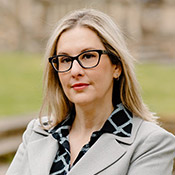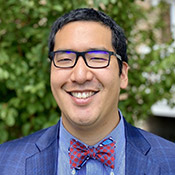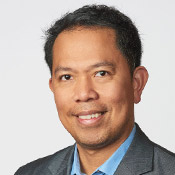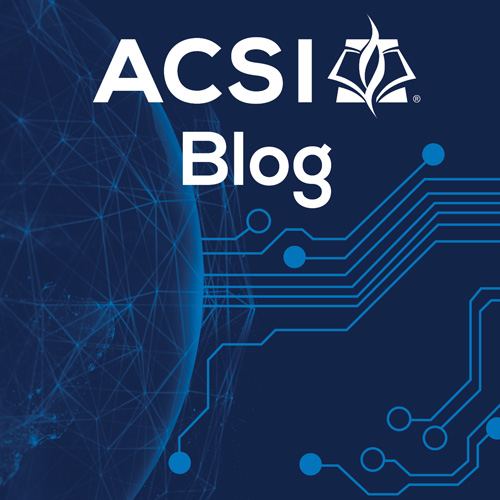ACSI Research Fellow Program
The Research Fellowship program at ACSI offers a unique opportunity for talented researchers to contribute to advancing the field of Christian education while addressing critical global challenges. By fostering collaboration, knowledge exchange, and innovative research, the program aims to make a significant impact on the world stage.
Program Aims:
- Create a vibrant and inclusive international research community.
- Foster collaboration, knowledge exchange, and innovative solutions to address both US and global challenges through research projects in Christian education.
Program Oversight:
- The fellows will collaboratively work with ACSI’s research department and Thought Leadership and the Research Director will oversee the program.
ACSI Fellows Collaborate on Research to Advance Faith-Based Education
ACSI Fellows collaborate with the Thought Leadership team (Research Department) to develop research and Working Papers on important topics in education, spirituality, and culture, focusing on their impact within the realm of Christian education. Their work addresses current trends and challenges, offering valuable insights for advancing faith-based learning.

RiB is a biannual publication by ACSI, aimed at sharing the latest research findings and insights on the Christian school sector. It is available exclusively to ACSI member school and is managed by ACSI Director of Research.

Lynn Swaner Ed.D.
President of Cardus USA – ACSI Senior Research Fellow

Matthew Lee, Ph.D.
Clinical Assistant Professor of Economics at Kennesaw State University - ACSI Senior Research Fellow

Francis Ben, Ph.D.
Associate Professor & Head of Postgraduate Coursework and Research at Tabor College Adelaide Australia – ACSI Global Research Fellow

Alison Heape Johnson
PhD candidate at the University of Arkansas – ACSI Junior Research Fellow
Eligibility:
- Understanding of Christian education.
- Strong academic credentials (e.g., relevant degrees, publications, minimum a Ph.D. candidate in education programs for Junior Fellow and a Ph.D. or Ed.D. for Senior Fellow).
- Demonstrated research excellence.
- Experience in international research collaboration.
- Excellent English communication skills.
- Minimum five years experience of doing research.
Nomination and selection process:
- The selection of the fellows is done through ACSI’s internal nomination.
Best Practices in Science
Effective educators stay updated on research and integrate new findings, technology, and methodologies into their teaching. Just as the practices of professionals in fields like engineering and medicine evolve with advancements, teachers must adapt their procedures to align with current educational research. A mechanic cannot service an electric car using outdated techniques, and a dentist must also apply contemporary methods. Similarly, teachers should embrace research-backed instructional shifts to meet students’ needs. Research in child development and brain-based learning continuously changes educational pedagogy. Best practices must reflect research and data-supported shifts in education. In science education, best practices emphasize student-centered learning over traditional, teacher-led instruction. Instead of rote memorization, students should explore concepts through inquiry, critical thinking, and collaboration. According to research (Laal & Ghodsi, 2012), incorporating opportunities for collaboration has social, psychological, and academic benefits for students beyond the classroom. Collaboration increases students’ self-esteem, reduces their anxiety, equips students with problem-solving skills, and influences them to become actively engaged in their learning process. Science instruction should build on students’ natural curiosity, encouraging real-world applications that make learning meaningful. By fostering engagement and deeper understanding, these research-supported strategies align with advancements in child development and brain-based learning, ensuring that science education remains dynamic and effective.
Teachers can easily integrate the following science best practices into classrooms:
- Differentiation: Differentiating science instruction is as crucial as adapting teaching for math, language arts, and reading. Effective strategies include small group collaboration, flipped learning, and kinesthetic activities. Teachers should appeal to varied learning modalities, use visual aids, and chunk content to enhance student engagement. Assessments, both formative and summative, can be tailored using sentence frames, graphic organizers, and self- or peer-assessments. Providing student choice within consistent learning goals helps boost motivation and achievement. Differentiation ensures all students can succeed, regardless of their unique styles and abilities.
- Inquiry-Based Learning: Inquiry-based science is a question-driven method that fosters deep understanding and motivation in students. It involves asking authentic questions, planning, gathering, analyzing, and organizing data to answer those questions with evidence, and then generating further inquiries. According to the National Science Teachers Association, inquiry-based science mirrors how scientists explore the natural world, helping students develop scientific knowledge and understand scientific processes. This approach is critical, as many students struggle with science. Building explanations with data poses challenges, with students often misunderstanding evidence, ignoring contradictory data, and focusing on claims without explaining supporting evidence. Research underscores the effectiveness of inquiry-based teaching, showing consistent increases in student understanding. Active learning, emphasizing investigations and evidence-based reasoning drives achievement. Importantly, the quality of students' explanations influences overall science performance. Best practices include teaching the distinction between data and evidence, modeling data collection and explanation-building, promoting argumentation based on evidence, guiding productive discussions, and fostering respectful communication. These strategies enhance inquiry-based science, enabling students to ask and answer questions with confidence and clarity. Teachers can include inquiry-based learning in the science classroom by encouraging students to ask questions, design experiments, and draw conclusions through hands-on investigations, labs, simulations, and engineering challenges.
- Three-Dimensional Learning Model: The three-dimensional pedagogical approach is an inquiry-based educational method blending content knowledge with scientific practices and thinking skills. It provides students with meaningful learning experiences by integrating three core dimensions: Disciplinary Core Ideas (DCIs), Science and Engineering Practices (SEPs), and Crosscutting Concepts (CCCs). This model is central to science education, especially the Next Generation Science Standards (NGSS). DCIs are fundamental knowledge concepts and principles in science that students should understand. They are organized into four areas: physical, life, earth, and engineering sciences. SEPs represent science processes students actively engage in to become proficient in a discipline and to learn how science works. Some practices include asking questions, developing models, conducting investigations, and analyzing data. CCCs are a set of broad overarching cognitive processes that apply across all scientific disciplines, such as patterns, cause and effect, systems and system models, and energy and matter. They help students make connections between different scientific phenomena. Teachers enable students to explore how science works as an interconnected system, fostering a deeper understanding of real-world phenomena. The approach emphasizes active learning, critical thinking, and the application of science across disciplines for holistic education.
- Phenomena-Based Teaching: Phenomenon is an observable event. Start lessons with real-world phenomena that spark curiosity and require scientific explanations. Engaging with phenomena makes learning more relevant.
- Student Discussions: Help students develop critical thinking and communication skills by guiding them to make evidence-based claims, critique reasoning, and participate in scientific discussions.
- Student-Created Models: Have students create models to explain how phenomena work and to articulate their understanding.
- Cross-Disciplinary Learning: Make learning more comprehensive by connecting science with math, technology, engineering, and art (STEAM).
- Technology and Digital Tools: Incorporate online simulations, data-analysis tools, and virtual labs to deepen understanding and provide interactive experiences.
Incorporating these and other best practices can help teachers advance beyond traditional lectures or textbook-based learning in science. By integrating diverse instructional strategies, teachers can create engaging and effective experiences that significantly enhance student understanding and impact learning journeys.
References
Drapeau, P. (2021). Inspiring Student Empowerment: Moving Beyond Engagement, Refining Differentiation. Free Spirit Publishing.
Ferlazzo, L. (2021, July 17). The Three Most Effective Instructional Strategies for Science—According to Teachers. Education Week. https://www.edweek.org/teaching-learning/opinion-the-three-most-effective-instructional-strategies-for-science-according-to-teachers.
Laal, M., & Ghodsi, S. M. (2012). Benefits of Collaborative Learning. Procedia - Social and Behavioral Sciences, 31(31), 486–490. https://doi.org/10.1016/j.sbspro.2011.12.091.
Minner, D. D., Levy, A. J., & Century, J. (2010). Inquiry-based science instruction-what is it and does it matter? Results from a research synthesis years 1984 to 2002. Journal of Research in Science Teaching, 47(4), 474–496. https://doi.org/10.1002/tea.20347.
Williams, L. (2021, February 7). The Five Best Practices for Teaching Science. Teaching Science with Lynda R. Williams. https://teachingscience.us/the-five-best-practices-for-teaching-science.
Zemelman, S., Daniels, H., & Hyde, A. A. (2012). Best Practice: Bringing Standards to Life in America’s Classrooms. Heinemann.




Leave a comment